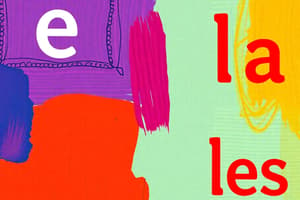Podcast
Questions and Answers
In French, the singular definite article used before 'ami' is ______.
In French, the singular definite article used before 'ami' is ______.
l'ami
The correct definite article to use before 'homme' in French is ______.
The correct definite article to use before 'homme' in French is ______.
l'homme
For the word 'lampe', the appropriate singular definite article in French is ______.
For the word 'lampe', the appropriate singular definite article in French is ______.
la lampe
The French singular definite article for 'fenêtre' is ______.
The French singular definite article for 'fenêtre' is ______.
When referring to 'hôtel' in French, the correct singular definite article is ______.
When referring to 'hôtel' in French, the correct singular definite article is ______.
To specify 'realism' in French, one would use the singular definite article ______.
To specify 'realism' in French, one would use the singular definite article ______.
The correct singular definite article preceding 'ingénieur' in French is ______.
The correct singular definite article preceding 'ingénieur' in French is ______.
To refer specifically to 'publicité' in French, you would use the article ______.
To refer specifically to 'publicité' in French, you would use the article ______.
In French, one refers to the specified 'comedy' by using the singular definite article: ______.
In French, one refers to the specified 'comedy' by using the singular definite article: ______.
To denote 'the difference' in French, the appropriate definite article is ______.
To denote 'the difference' in French, the appropriate definite article is ______.
The French singular definite article that should be used when discussing 'médecin' is ______.
The French singular definite article that should be used when discussing 'médecin' is ______.
To speak of 'the sculpture' in French, the correct definite article is ______.
To speak of 'the sculpture' in French, the correct definite article is ______.
When discussing 'prononciation' in French, the correct singular definite article is ______.
When discussing 'prononciation' in French, the correct singular definite article is ______.
When you want to eat 'the cake' use the appropriate article ______.
When you want to eat 'the cake' use the appropriate article ______.
Explain the nuances that dictate when someone might choose between 'le', 'la', and 'l'' when several nouns in a sentence begin with the same letter such as 'l'ami', 'la lampe' and 'le livre'. Understanding the ______ is key to applying the correct article.
Explain the nuances that dictate when someone might choose between 'le', 'la', and 'l'' when several nouns in a sentence begin with the same letter such as 'l'ami', 'la lampe' and 'le livre'. Understanding the ______ is key to applying the correct article.
Consider the phrase 'L'homme est sur l'ile,' where the definite article elides to 'l'' before both 'homme' and 'ile.' However, in 'Le héros est sur la montagne,' 'le' does not elide. Explain the historical phonetic principle concerning the ______ of words like 'homme' that governs this elision.
Consider the phrase 'L'homme est sur l'ile,' where the definite article elides to 'l'' before both 'homme' and 'ile.' However, in 'Le héros est sur la montagne,' 'le' does not elide. Explain the historical phonetic principle concerning the ______ of words like 'homme' that governs this elision.
Given the prevalence of exceptions and unpredictable gender assignments in French nouns, develop a novel mnemonic technique leveraging ______ to aid learners in accurately recalling the gender and thus the correct definite article for common nouns encountered in everyday conversation. Explain the technique.
Given the prevalence of exceptions and unpredictable gender assignments in French nouns, develop a novel mnemonic technique leveraging ______ to aid learners in accurately recalling the gender and thus the correct definite article for common nouns encountered in everyday conversation. Explain the technique.
The basic rules for french articles depend largely on the ______ of the noun.
The basic rules for french articles depend largely on the ______ of the noun.
When a French noun begins with a vowel or mute 'h,' the definite article ______ is typically used, regardless of the noun's gender.
When a French noun begins with a vowel or mute 'h,' the definite article ______ is typically used, regardless of the noun's gender.
Although 'le' is generally used for masculine nouns, ______ is used when the noun begins with a vowel sound.
Although 'le' is generally used for masculine nouns, ______ is used when the noun begins with a vowel sound.
Flashcards
l'ami
l'ami
Masculine noun starting with a vowel; means friend.
l'homme
l'homme
Masculine noun starting with a mute 'h'; means man.
la lampe
la lampe
Feminine noun; means lamp.
la fenêtre
la fenêtre
Signup and view all the flashcards
l'hôtel
l'hôtel
Signup and view all the flashcards
le réalisme
le réalisme
Signup and view all the flashcards
l'ingénieur
l'ingénieur
Signup and view all the flashcards
la publicité
la publicité
Signup and view all the flashcards
la comédie
la comédie
Signup and view all the flashcards
la différence
la différence
Signup and view all the flashcards
le médecin
le médecin
Signup and view all the flashcards
la sculpture
la sculpture
Signup and view all the flashcards
la prononciation
la prononciation
Signup and view all the flashcards
le gâteau
le gâteau
Signup and view all the flashcards
Study Notes
- This exercise focuses on using the correct singular definite article (le, la, l’) in French.
- Pay attention to the gender of the noun (masculine or feminine).
- Also, consider whether the noun begins with a vowel or a mute 'h'.
Noun and Article Combinations
- ami (m.): l'ami.
- homme (m.): l'homme.
- lampe (f.): la lampe.
- fenêtre (f.): la fenêtre.
- hôtel (m.): l'hôtel.
- réalisme (m.): le réalisme.
- ingénieur (m.): l'ingénieur.
- publicité (f.): la publicité.
- comédie (f.): la comédie.
- différence (f.): la différence.
- médecin (m.): le médecin.
- sculpture (f.): la sculpture.
- prononciation (f.): la prononciation.
- gâteau (m.): le gâteau.
Rules for Definite Articles
- Use "le" for masculine nouns beginning with a consonant.
- Use "la" for feminine nouns beginning with a consonant.
- Use "l’" for nouns of either gender that begin with a vowel or a mute 'h'.
Studying That Suits You
Use AI to generate personalized quizzes and flashcards to suit your learning preferences.




